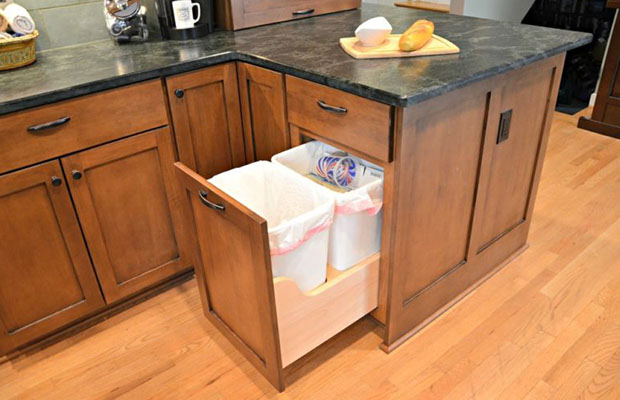How carefully did you choose the trash cans for your home? If you’re like most people, you probably gave it very little thought. It is surprising how few people conduct their own research before buying a household item that is so crucial to maintaining a clean and organized home. One trash can choice is one you should think about carefully: size.
Size does matter when it comes to trash cans. It can seem like a math problem to determine what size trash can your home requires. Kitchen trash cans come in varying sizes for different applications. A 13-gallon trash can also referred to as a typical kitchen-size trash can, is the most widely used trash container.
Here are some factors to think about when choosing the appropriate trash can size for your residence.
Table of Contents
What Is The Typical Size Of A Kitchen Trash Can?
The most popular size for trash cans is the kitchen size. They typically come in sizes between 10 and 20 gallons, but 13 gallons is the accepted norm. These cans are commonly used at home and are typically found in the kitchen, as their name would imply.
Factors That Influence Size Of Kitchen Trash Can
1. What Room Is It For?
Since the kitchen is typically where the most trash is produced, it is common for households to have their largest trash can there. Because bathroom trash cans must fit in a small space and little waste is generated there, they are probably going to be very small. Other trash containers, which can be a little bigger, are frequently put in bedrooms, garages, or offices.
The exact sizes will vary due to the other elements on this list, but in general, a bathroom trash can will hold around 4 gallons, a bedroom or office trash can will hold around 7–10 gallons, and kitchen trash cans typically hold around 12–16 gallons.
2. How Many People Do You Have Living There?
How many people live in your house has a significant impact on how much trash is produced there. A family of six or more will likely produce more trash than two or three people sharing a space. The trash can you ultimately want will be larger the more trash you produce.
Young couples or empty nesters can probably manage with the main trash can of 7–10 gallons. For a family of four, sizing up to 12–16 gallons will be ideal in order to reduce the number of trash pick-ups. Size up to 20–30 gallons for the primary waste container in a large family or a home shared by more than four people.
3. How Much Garbage Do You Produce?
In comparison to someone who throws all of their food waste in with their regular trash, you probably produce a lot less trash if you have a compost pile or your city picks up compost at the curb. You probably produce a lot more waste than the average person if your trash service doesn’t offer recycling pick-up. (Those who do not have curbside recycling are urged to locate a recycling facility and deliver their recyclables there.)
A 7–10 gallon trash can be adequate for the other waste you produce if you compost and recycle. Size your containers up to 12–16 gallons if you plan to throw food waste in with your trash. A 20- to the 30-gallon trash can is appropriate if food, recyclables, and trash are all thrown in the same container.
4. What Kind Of Room Do You Have?
A large trash can takes up valuable floor space in a small kitchen and is an obstruction. While an under-sink trash can is useful for recovering floor space, it has a size restriction. Prior to making a purchase, it’s crucial to consider the location of your trash can and the available space.
Your trash can needs to be shorter than that in order to allow space to place trash inside most under-sink cabinets, which are 30 inches tall. The ideal trash can size is typically a 7–10 gallon container, but first, measure the area under your sink. If it is between 12 and 16 gallons, a beautiful stainless steel trash can fits easily in a corner and enhances the decor of a larger kitchen. A large 20–30 gallon trash can might fit well next to a kitchen island or in a pantry if there is no shortage of space in your kitchen.
5. How Big Of A Bag Do You Prefer?
Using old grocery bags instead of standard trash bags might be preferable if you have a lot of them to recycle. However, if the bag is much smaller than your trash can, you will only be making more mess. In addition to producing more waste, using a 30-gallon bag with a 10-gallon trash can will make more mess.
Spend less money on trash cans that don’t fit your preferred bag style or trash bags that don’t fit your trash cans. You can choose the ideal trash bag to go with any trash can with the aid of our trash can liner guide.
6. What Size Kitchen Trash Can Suits Me?
The ideal kitchen trash can size will depend on a number of variables, but the two that matter the most are the amount of trash you’ll be producing and the location of the can.
- What percentage of waste do you produce? If you cook a lot at home, it’s very easy to start creating tons and tons of waste. Because of this, you’ll want a sturdy can that can handle problems without leaking and one with a lid (most likely), since you don’t want any odors to enter your kitchen.
- Where will the can go? Make sure the can fits where it will be placed according to where you plan to put it. You shouldn’t want it to be too tall if it goes underneath your sink, and again, if it’s outside the sink area, you should make sure it’s covered to prevent odor.
7. Trash Can Sizes For Different Lifestyles
Your lifestyle plays a significant role in determining the size of your trash can. Although important, each of these elements is ultimately relative.
For example, you may spend a lot of time at home. You’ll likely be in charge of cleaning up a lot of trash at home. Consequently, a larger trash can will be needed. If you’re a student, a working adult, or someone who travels frequently, on the other hand, you’ll produce less trash at home, making smaller trash cans a viable option.
Your kitchen waste will increase if you prefer to cook at home. Larger kitchen trash bags are necessary for this kind of lifestyle, which calls for larger trash cans.
And lastly, if you have children in your home, it is preferable to choose large-sized cans. After all, waste production among children is generally higher. The list is endless and ranges from diapers to snacks and chocolate wrappers. The larger size will also make it easier for them to put the trash inside the bin as opposed to outside.
Size Of Bathrooms Trash Cans
Bathroom trash cans come in sizes ranging from 1 to 9 gallons; they are also excellent for bedrooms and other small spaces. Smaller-size trash cans are typically adequate in bathrooms and bedrooms because they don’t typically fill up as quickly as kitchen trash cans do.
What Size Trash Can Is Required?
The number of people living in your home and the amount of waste generated will ultimately determine the right-sized trash can for your space. A 13-gallon trash can is typically adequate for households with 1-3 occupants. You might want to think about getting a bigger trash can if there are more than three people living in your house. A kitchen should have up to 20 gallons.
Bedrooms and bathrooms typically need much smaller trash cans, but frequently used bathrooms might need a larger waste container. Homes with more than three occupants may require a bathroom trash can with a capacity of up to nine gallons.
The Bottom Line
Kitchen trash cans are a necessary fixture because they maintain the room’s cleanliness and organization. One would be surprised to learn that there are numerous factors to take into account when choosing the ideal trash can size for a kitchen. This is the case even for homeowners.
Choosing the kitchen trash can that best suits you requires taking into account all of the aforementioned factors before purchasing.
Read More: Oven Cleaner On Kitchen Countertops


